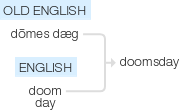Doomsday
Old English dōmes dæg (see doom, day).
wiktionary
From Middle English domes + dai, from Old English dom(“judgment”) + dæg(“day”). Equivalent to doom + -s- + day. Possibly influenced by Latin domus dei(“house of God”).
etymonline
doomsday (n.)
"day of the last judgment," Middle English domesdai, from Old English domes dæg, from domes, genitive of dom (see doom (n.)) + dæg "day" (see day (n.)).
In medieval England doomsday was expected when the world's age had reached 6,000 years from the creation, which was thought to have been in 5200 B.C.E. Bede, c. 720, complained of being pestered by rustici asking him how many years till the sixth millennium ended. However there is no evidence for the story of a general panic in Christian Europe in the year 1000 C.E.
Doomsday machine as the name of a hypothetical nuclear bomb powerful enough to wipe out human life (or all life) on earth is from 1960.
